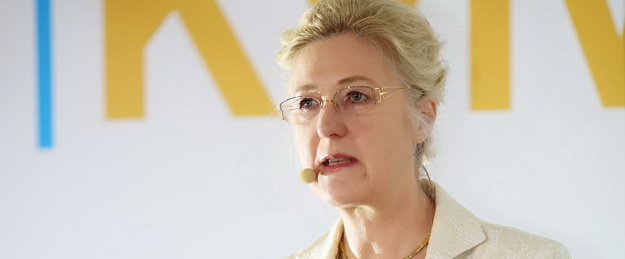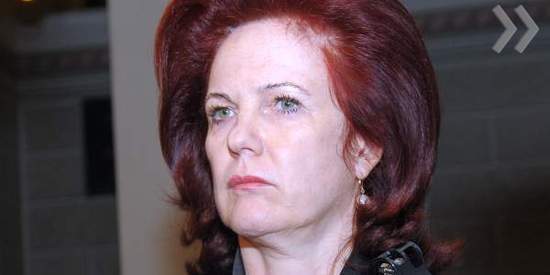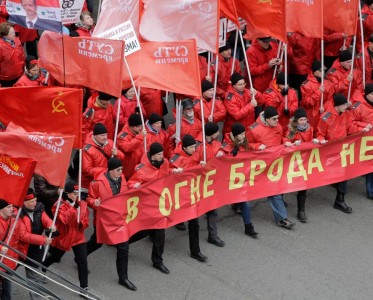Gerlinda Nigus is one the heads of NATO’s public diplomacy department.
Few in Ukraine have heard about those, which is understandable: for decades we’ve thought NATO to be an exclusively military structure. However, the civilian part of the Alliance is actually pretty robust, and in the hybrid war era it has been gaining importance.
We got the idea to talk with Gerlinda Nigus in early September, after she admitted during her address in Kyiv: “we’ve gone into an epoch of information war with Russia”. European Pravda met the NATO official in Brussels to learn the details of the Alliance’s news stance.
“We want to keep a dialog with Russia, even if the dialog is dubious”
Two weeks ago, at the Davos economic forum, you said you had to work in the conditions of an information war. This is quite a bold statement, and I want to know the details. Who’s fighting whom?
The belligerent is Russia. It has really “weaponized information”, it actively uses deliberate misinformation as a weapon. Concerning the other party… Obviously, Russia is waging war against Ukraine, the West and the whole world.
But the first and foremost goal of Russia’s propaganda is their own Russian people as well as Ukrainians. However, it is apparent that the information war is also being waged in NATO countries, the alliance’s partners Georgia and Moldova and especially the Balkans.
If Russia is attacking, is NATO responding to these attacks?
Yes, but not on an eye-for-an-eye basis. We can’t allow ourselves to “fight fire with fire”.
Not using propaganda to battle propaganda is NATO’s principle.
Why?
You have to distinguish the two terms. Propaganda is information based on lies and manipulation. If we move down that path, we’ll lose credibility. And it is credibility that our power lies in.
This is why Russia would want us to give a symmetric response to propaganda, but we have to refrain from it, or we’ll lose our advantage in the information field.
This is why in response we intensify our information campaign. But we are not spreading lies.
However, Russia’s propaganda turned out to be quite effective, including in EU and NATO countries, affecting even higher officials. For instance, politicians that speak about Donbas often mention the “Ukraine crisis”. Russia’s role is somehow pushed on the sidelines…
This may be an issue of linguistic simplicity. But I do agree that Russian talking points find support in various European countries.
But I wouldn’t agree with the notion of Russia’s success.
Look at the polls – critical attitude to Russia as grown substantially! In my country, Germany, over 70% are very critical towards modern Russian and Putin’s policies. That was far from the case 2 or 3 years ago.
The situation in other countries is similar. Gradually, more and more people realize how Russia is dependent on its own lies, how persistent it is in confusing us and making it impossible to make our own conclusions.
So I don’t think they are that successful, despite all the money they invest in these efforts. And the investment is huge.
At the same time we need to raise awareness of the European media that the so-called “Russian media” often aren’t media in the classic sense, not always follow the standards and principles Europeans are used to.
Ukrainians are quite aware what “Russian media” are, but it’s somewhat different in Europe. However, many Western journalists are already aware what Russia Today’s goal is – they aim to manipulate the public consciousness and do it very professionally.
You can argue about the efficiency of Russia’s propaganda in the EU, but it’s definitely very successful in Russia proper. Putin’s 86% support is just one example.
(sighs) You are right… This is an incredibly difficult problem.
Reaching out to the Russian-speaking audience, especially the part living in Russia, is extremely difficult. But we are trying.
This is why we keep the communication channels open. NATO’s information office is still working in Moscow, although it’s quite difficult.
Its head, Robert Pshel, is quite a frequent guest at Russian talk shows, the so-called debates, although we perfectly realize that they don’t necessarily conform to professional journalistic standards (laughs). However, he keeps going there, “bearing the NATO flag”,
We invite and bring journalists and experts from Russia to Alliance events.
All of this is very difficult, but we are sending a message: we won’t to keep a dialog with Russia. Even if the dialog is dubious.
“Many sincerely believe Ukraine is ruled by a fascist junta”
By the way, do you know that Western remarks about “dialog with Russia” are viewed quite critically in Ukraine? Any news like this are criticized and suspicions arise that NATO or the EU are ready to sacrifice Ukrainian interests to restore friendship with the Kremlin.
– Of course not! That would mean sacrificing our values, which we won’t do!
I do realize any attempts to set up communication with Russia may infuriate Ukrainians, but reaching dialog is another principle of ours. Yo need dialog if you strive for peaceful resolution of conflicts. But if all communication channels are severed, the risks become considerably higher!
I don’t think this is in Ukraine’s interests.
What risks are you talking about?
The example that has been cited many times – the situation in the skies when Russian military planes switch off transponders, and due to lack of communications with Russia there’s a threat of their collision with civilian aircraft.
But I’ll cite another argument.
Russia has been conducting a lot of unannounced exercises on the Ukrainian borders. Such Russian activities can be wrongly interpreted, and there’s a risk of our response based on entirely false assumptions. Even basic information from Russia can help avoid this.
Meanwhile, the media have suggested Russia is preparing to mend its conflict with the West by fighting the Islamic State. It is no secret that Russian troops on the ground confront ISIS in defense of Assad, while the West is unlikely to commit to a ground intervention.
I wouldn’t like to speculate. I can’t react to the information on Moscow’s support of Assad in his fight against his own people.
Several NATO member states have already expressed the opinion that
this is not aid to the West, but, on the contrary, a very dangerous and uninvited escalation by Russia
that will not help solve the crisis but only exacerbate the already difficult situation in the country.
But right now we are at a very early stage of the process and I won’t speculate what it will lead to. First of all, because I don’t know what Putin really thinks. And, probably, no one does.
Who is at war with Ukraine: the Kremlin, the elites or the Russian people? You’ve already mentioned Putin’s support being exorbitant.
That’s a difficult question. We have to take into account that during Putin’s long rule a large part of the population has been brainwashed. Most of them sincerely believe that Ukraine is ruled by a fascist junta, that the West has organized a coup and regime change in Kyiv and similar nonsense.
This is why Russian population does believe Putin and his team to be right. Very few people in Russia have a critical approach to this information.
Nevertheless, neither the NATO nor its member states have the right to give up and stop the attempts to make more precise and objective information on world events available for Russia. It also has to be freely accessible in Russian. The Alliance is just one entity making efforts in this field. Member states and their independent media (that maintain Russian-language versions) also work on this.
Naturally, that can’t change the situation quickly.
But our relations with Russia need what I call strategic patience. We have to wait and keep doing what we do now.
Else we would just admit defeat. And I think that would be a mistake.
Apart from that, I’m sure that the percentage of skeptics in Russia is way higher than the polls say. These people are a part of the “silent majority” and aren’t ready to admit to pollsters that the government is doing something wrong. But a deeper analysis shows that the Russian society has a significant level of discontent and distancing from the regime.
These are the people we have to convince. We have to show we haven’t abandoned them.
“The NATO is viewed as a military organization, but this is not the case”
Nato has declared its goal to increase military budgets to adapt to the new reality. Since last year, the Alliance insists that NATO member states should spend at least 2% GDP on defense, this decision confirmed at the Wales summit. What about non-military efforts? In a hybrid war, it’s not on;;y the army, that’s important.
Here’s an important detail: I realize that the NATO is viewed first and foremost as a military organization, but this is not quite right. The Alliance is above all an organization led by politicians. We get our mandate for actions, including military actions, not from military men, but from heads of states and governments. Only then do the military men come to advise how to perform this or that action.
This is why the NATO is above all a political, not a military organization. Our Brussels HQ is equipped by 1000 civilian staff and only 500 servicemen.
Naturally, our unique resource is NATO’s collective defense including modern military command structures. But even collective defense can only be launched if approved by all 28 civilian leaders, i.e. politicians.
This is why these 2% GDP expenses are allocated mostly to the military, but also benefit the civilian side. We also have separate budgets for information activities.
Concerning NATO budget, it has three parts: civilian, military and infrastructure projects. And the part of non-military expenses is quite large.







